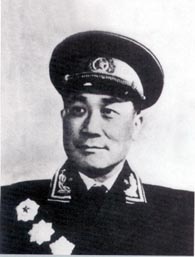Zhang Guohua
| Zhang Guohua | |
|---|---|
| 张国华 | |

Zhang Guohua in 1955
|
|
| Communist Party Secretary of the Tibet Autonomous Region | |
|
In office 24 January 1950 – February 1952 |
|
| Preceded by | None (Post Created) |
| Succeeded by | Zhang Jingwu |
|
In office 1965–1967 |
|
| Preceded by | Zhang Jingwu |
| Succeeded by | Zeng Yongya |
| Governor of Sichuan | |
|
In office 1968–1972 |
|
| Preceded by | Li Dazhang |
| Succeeded by | Liu Xingyuan |
| Commander of Chengdu Military Region | |
|
In office 1952–1965 |
|
| Personal details | |
| Born | October 1914 Yongxin County, Jiangxi Province, Qing Empire |
| Died | February 21, 1972 (aged 57) Chengdu |
| Political party | Communist Party of China |
| Military service | |
| Allegiance |
|
| Service/branch |
|
| Years of service | 1931-1972 |
| Rank |
|
| Commands | Field commander during Sino-Indian War |
| Battles/wars | Long March, 2nd Sino-Japanese War, Chinese Civil War, Sino-Indian War |
Zhang Guohua (simplified Chinese: 张国华; traditional Chinese: 張國華; pinyin: Zhāng Guóhuá; Wade–Giles: Chang Kuo-hua; October 1914-February 21, 1972) was a Chinese Lieutenant general and a politician, serving during the Invasion of Tibet and the Sino-Indian War and later as a Communist Party secretary for the Tibet Autonomous Region.
Zhang Guohua was born in Yongxin, Jiangxi in 1914. He joined the Communist Party of China in 1931.
As commander of the Southwest Eighteenth Army Corps of the People's Liberation Army, he led the main attack force in the 1950 Qamdo campaign against Tibetan forces. Zhang was chosen for his special knowledge of Tibetan culture; Mao Zedong did not want to alienate the Tibetans and gave strict instructions "to do united front work" by respecting the local religion and customs. In contrast to the leader of the Northwest Army, Fan Ming, he supported the Dalai Lama and avoided marching into the city after the victory. Zhang seized the position of Secretary of the CPC Tibet Committee from 1950 to 1952, until Mao Zedong, on learning of his power struggle with Fan, replaced him with Zhang Jingwu as Secretary. Still, Zhang headed the Tibet Work Committee, which would negotiate the items in the Seventeen Point Agreement for the Peaceful Liberation of Tibet. Zhang only made passing reference to the negotiations in his memoirs. Zhang would resume his position as secretary from 1965 to 1967.
...
Wikipedia
